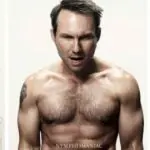Table of Contents
‘The Life of Chuck’ Contains Multitudes
‘The Life of Chuck’, based on Stephen King’s 2020 novella, director Mike Flanagan crafts a reverse-chronological odyssey through the life of Charles “Chuck” Krantz (Tom Hiddleston). It is an elegiac meditation on memory, mortality, and moments of transcendence.
The story begins at the end- amidst Chuck’s final moments and a world seemingly unraveling- then winds backward through three interwoven acts that explore his adulthood, childhood, and the threads that connect them. Tom Hiddleston leads a powerhouse ensemble, including Mark Hamill as Chuck’s loving but complicated grandfather Albie, Chiwetel Ejiofor as Marty Anderson, a kind and reflective teacher, and Karen Gillan as a tirelessly busy nurse– perhaps the film’s quietest reflection of our current climate of collective burnout and emotional fatigue.
Tom Hiddleston plays Chuck with a kind of weary grace- a quiet, inward ache. His post-Marvel trajectory has been refreshingly unpredictable, especially compared to some of his fellow MCU alumni whose careers post-’Avengers: Endgame’ have faltered. Chris Evans, for instance, recently joked in an interview he did with his ‘Materialists’ co-stars that if he put his co-stars in the movies he’s doing he would “ruin both of those careers,” referencing his own struggles since hanging up the Captain America shield.
There doesn’t seem to be a set path for life after the MCU. Hiddleston found his way back to Shakespeare while Robert Downey Jr., hot off his Academy Award win for Best Supporting Actor in ‘Oppenheimer’, made a bold return to theater with the Broadway play McNeal– which, despite the effort, landed with a critical thud. But Hiddleston’s choice to anchor something as introspective and lyrical as ‘The Life of Chuck’ suggests an actor still seeking, still stretching.
And then there’s Benjamin Pajak. Though his only major credit prior to this was his acclaimed stage debut in the Broadway revival of ‘The Music Man’ opposite Hugh Jackman and Sutton Foster– for which he earned a Theatre World Award in 2022- Pajak delivers one of the most straightforwardly honest portrayals of childhood in recent memory. His performance calls to mind the open-hearted wonder of early Spielberg juveniles, like Henry Thomas in ‘E.T.’ or Cary Guffey in ‘Close Encounters of the Third Kind’. But there’s also an emotional maturity here that aligns more with the quiet ache of Jacob Tremblay in ‘Room’ or ‘Wonder’. He’s not just a child actor- he’s a presence. One of those rare talents who both fits perfectly on screen and seems capable of reaching far beyond it.
So, as the song goes: be prepared. Because wherever Pajak chooses to go- whether it’s the stage, the screen, the page, or the canvas- you’ll want to follow. If he continues down this road of genuine expression, we may be witnessing the start of something extraordinary.
Things to do:
- Subscribe to The Hollywood Insider’s YouTube Channel, by clicking here.
- Limited Time Offer – FREE Subscription to The Hollywood Insider
- Click here to read more on The Hollywood Insider’s vision, values and mission statement here – Media has the responsibility to better our world – The Hollywood Insider fully focuses on substance and meaningful entertainment, against gossip and scandal, by combining entertainment, education, and philanthropy.
Rated R, for Everyone
After seeing ‘The Life of Chuck’, I’m genuinely surprised that it carries an R rating. There’s some language, yes, but very little else that even brushes against the kind of content you’d expect from such a label. There’s some language, sure, but hardly anything else that warrants the label. No sex. No drugs. There is rock and roll– but that’s easily the most innocent of the trio.
The film plays, particularly in its third act, like a Lemony Snicket story stripped of menace- a quiet, strange memory told with compassion, even uplifting. The scariest figure a young Chuck faces is his own grandfather, who comforts him immediately after his in the heat of the moment outburst after shoving him out of the harm’s way of a haunted cupola filled not with ghosts, but with visions of the future.
Honestly, I’m upset by the rating. Because this is exactly the kind of movie I want kids to see. A movie that doesn’t talk down to them. That lets them reckon with mortality- not in a terrifying, grim way, but in a poetic, meditative one. It’s a film about endings, sure. But also about doing what you love while you can.
Nowhere is that message clearer than in the film’s most luminous moment: a five-and-a-half minute street dance sequence that feels like the film’s very heartbeat. The scene, filmed over four days in Mobile, Alabama, was choreographed by Emmy-winner Mandy Moore- known for her work on ‘La La Land’ and Taylor Swift’s ‘Eras’ tour. It captures Chuck dancing joyfully in the street with a beautiful stranger, the two feeding off the rhythm of a powerhouse drummer on the corner- each movement echoing the pulse of a world that’s ending, and yet somehow, still alive.
It’s a scene that nearly didn’t happen. Tom Hiddleston learned the steps remotely from London before arriving on set, where he burned through his shoes from the sheer number of takes. The number itself blends jazz, swing, cha-cha, polka, and even the moonwalk, mimicking the eclectic dance lessons Chuck once shared with his grandmother.
Mike Flanagan has called the scene the “crown jewel” of the film- emotionally, thematically, spiritually. “If that didn’t work,” he said, “the movie would not work.” It does work. And then some. Mandy Moore called the choreography “multi-lingual,” a testament to the layers of rhythm, memory, and love embedded in every movement. This is, of course, a metaphor for the line “I contain multitudes” from the Walt Whitman poem Song of Myself that plays as a central element in Chuck’s development in the 1st act (though technically 3rd, as you’ll recall the film plays in reverse) which culminates into a parting minute where Jacob Tremblay– playing Chuck as a teenager- recites what is essentially a mantra of self-love, and a promise to himself to live.
That’s the message of the film: If you hear music, dance. If you have time, use it. You might not get to do what you love every day. Maybe you never made it your career. Maybe you never got famous for it. But when you get a chance, do it. Life ends. Faster than you think.
This is the kind of film that should be shown in schools. That parents should show their kids when they start asking big questions. Because it doesn’t lie. It lets you feel the beauty in the grief.
I think that’s why it starts at the end. Firstly, so that we can be given a happy, hopeful ending since it’s technically the beginning, but also so that throughout the latter two-thirds of the movie, the audience is rooting for Chuck…to dance, to laugh, to love, to live.
WATCH THE TRAILER of the Film and the Revolution: ‘Can I Go Home Now?’
The Children Around the World Continue to Ask the question
Reading Between the Screams
Mark Hamill reportedly assumed he was signing on for a horror film. And who could blame him? With Mike Flanagan directing and Stephen King providing the source material, it was certainly an educated guess. But ‘The Life of Chuck’ turned out to be something else entirely: a meditative, surprisingly tender look at mortality and memory, not monsters.
It’s easy to forget that Stephen King isn’t just the guy behind ‘Carrie’, ‘Cujo’, or ‘It’. He’s also the man that gave us ‘The Body’, which became ‘Stand By Me’. He’s the reason we have ‘The Shawshank Redemption’. Yes, he writes horror. But he also writes hope- hope flickering at the end of a long, dark tunnel.
King describes ‘The Life of Chuck’ as “a happiness machine.” And Mike Flanagan- King’s latest and seemingly favorite interpreter- gets it. Flanagan has had a unique relationship with King’s work. His 2017 film ‘Gerald’s Game’ was one of the few adaptations that truly understood the psychological weight of King’s interior horror. ‘Doctor Sleep’, his sequel to ‘The Shining’, managed to please both King and Kubrick fans.
No small feat, considering King famously disliked Kubrick’s original take so much that he himself remade his book as a miniseries in 1997.
Flanagan, it seems, is the rare filmmaker King trusts. And that trust seems to be paying off, as Flanagan is set to direct yet another Stephen King property: ‘The Dark Tower’ as a TV series for Amazon Prime Video.
Related article: Want GUARANTEED SUCCESS? Remove these ten words from your vocabulary| Transform your life INSTANTLY
Related article: Streaming Services Are Killing Movie Theaters
The Existential Question at the Film’s Center
Without spoiling too much of the plot (because it’s best discovered slowly), the film unfolds in reverse. Or rather, it collapses backward. From Chuck’s death to his childhood. From an apocalyptic goodbye to a quiet mantra. And along the way, the film invites a subtle, lingering question: Is Chuck a real person in this world? Or is the world a dream within Chuck?
That central quandary that the audience must decide for themselves, is Chuck these people’s dream, or is he in theirs? It gives the film an ethereal, almost liminal tone. You don’t watch it so much as you drift through it. It’s less about plot than presence. Less about action than atmosphere. You’re watching the shape of a man’s life, like light from a dying star. Still reaching us, even after he’s gone.
Related article: EVOLUTION: Every Ryan Gosling Role From 1995 to 2020, All Performances Exceptionally Poignant
Related article: EVOLUTION: Every Henry Cavill Role From 2001 to 2021, All Performances Exceptionally Poignant
Related article: All Best Actor/Actress Speeches From The Beginning Of Oscars 1929-2019 | Hollywood Insider
A Happiness Machine in the Shape of a Life
‘The Life of Chuck’ is not a horror film. But it is a Stephen King story. Which means it’s about death. About the finite. About the cracks in time where grief and joy collide. And it’s not a children’s movie, exactly. But it’s a film children could grow into. One they could revisit across their lives.
It’s not a movie that offers simple answers. It doesn’t tell you what to feel. It just shows you a life. And then asks- what will you do with yours?
So yes, I’m still mad about the R rating. Because films like this don’t come around often. Films that say, without irony or condescension, that self-love matters. That beauty matters. That dancing in the face of death is not foolishness- it’s faith.
Watch this film. Let it haunt you. Not with the demons you know from Stephen King’s typical work, but with joy. Because as Chuck himself learns: the ghosts are already here. Inside of him. The ghosts of everyone and everything he’s ever encountered- the multitudes that, according to the central Walt Whitman poem, are contained within Chuck. In all of us.
Related article: Understanding the Star Wars Timeline
Related article: A Tribute to Francis Ford Coppola: One of Cinema’s Unforgettable Directors | ‘Megalopolis’, ‘The Godfather’ & More
Related article: #metoo Revolution: Powerful Questions That Need Answers
Related article: FACT-CHECKED Series: Timothee Chalamet and 32 Facts about The Young Superstar
By Joseph Tralongo
Click here to read The Hollywood Insider’s CEO Pritan Ambroase’s love letter to Cinema, TV and Media. An excerpt from the love letter: The Hollywood Insider’s CEO/editor-in-chief Pritan Ambroase affirms, “We have the space and time for all your stories, no matter who/what/where you are. Media/Cinema/TV have a responsibility to better the world and The Hollywood Insider will continue to do so. Talent, diversity and authenticity matter in Cinema/TV, media and storytelling. In fact, I reckon that we should announce “talent-diversity-authenticity-storytelling-Cinema-Oscars-Academy-Awards” as synonyms of each other. We show respect to talent and stories regardless of their skin color, race, gender, sexuality, religion, nationality, etc., thus allowing authenticity into this system just by something as simple as accepting and showing respect to the human species’ factual diversity. We become greater just by respecting and appreciating talent in all its shapes, sizes, and forms. Award winners, which includes nominees, must be chosen on the greatness of their talent ALONE.
I am sure I am speaking for a multitude of Cinema lovers all over the world when I speak of the following sentiments that this medium of art has blessed me with. Cinema taught me about our world, at times in English and at times through the beautiful one-inch bar of subtitles. I learned from the stories in the global movies that we are all alike across all borders. Remember that one of the best symbols of many great civilizations and their prosperity has been the art they have left behind. This art can be in the form of paintings, sculptures, architecture, writings, inventions, etc. For our modern society, Cinema happens to be one of them. Cinema is more than just a form of entertainment, it is an integral part of society. I love the world uniting, be it for Cinema, TV, media, art, fashion, sport, etc.
More Interesting Stories From The Hollywood Insider
– Want GUARANTEED SUCCESS? Remove these ten words from your vocabulary| Transform your life INSTANTLY
– A Tribute to Martin Scorsese: A Complete Analysis of the Life and Career of the Man Who Lives and Breathes Cinema
– Do you know the hidden messages in ‘Call Me By Your Name’? Find out behind the scenes facts in the full commentary and In-depth analysis of the cinematic masterpiece
– A Tribute To The Academy Awards: All Best Actor/Actress Speeches From The Beginning Of Oscars 1929-2019 | From Rami Malek, Leonardo DiCaprio To Denzel Washington, Halle Berry & Beyond | From Olivia Colman, Meryl Streep To Bette Davis & Beyond.
– In the 32nd Year Of His Career, Keanu Reeves’ Face Continues To Reign After Launching Movies Earning Over $4.3 Billion In Total – “John Wick”, “Toy Story 4”, “Matrix”, And Many More

Joseph Tralongo is a playwright and screenwriter who approaches storytelling with a deep respect for film’s ability to distill human behavior into meaningful moments. His personal work- i.e. his plays, screenplays, and films- leans into semantic tension, moral ambiguity, and the quiet unraveling of social dynamics- not to preach, but to parse. For him, writing is a slow excavation of truth through craft. With a background in theatre and independent film, he brings a structural precision and dramatic instinct to every film he reviews. Hollywood Insider’s mission to champion substance over spectacle aligns with Joseph’s belief that storytelling should investigate, not dictate.








